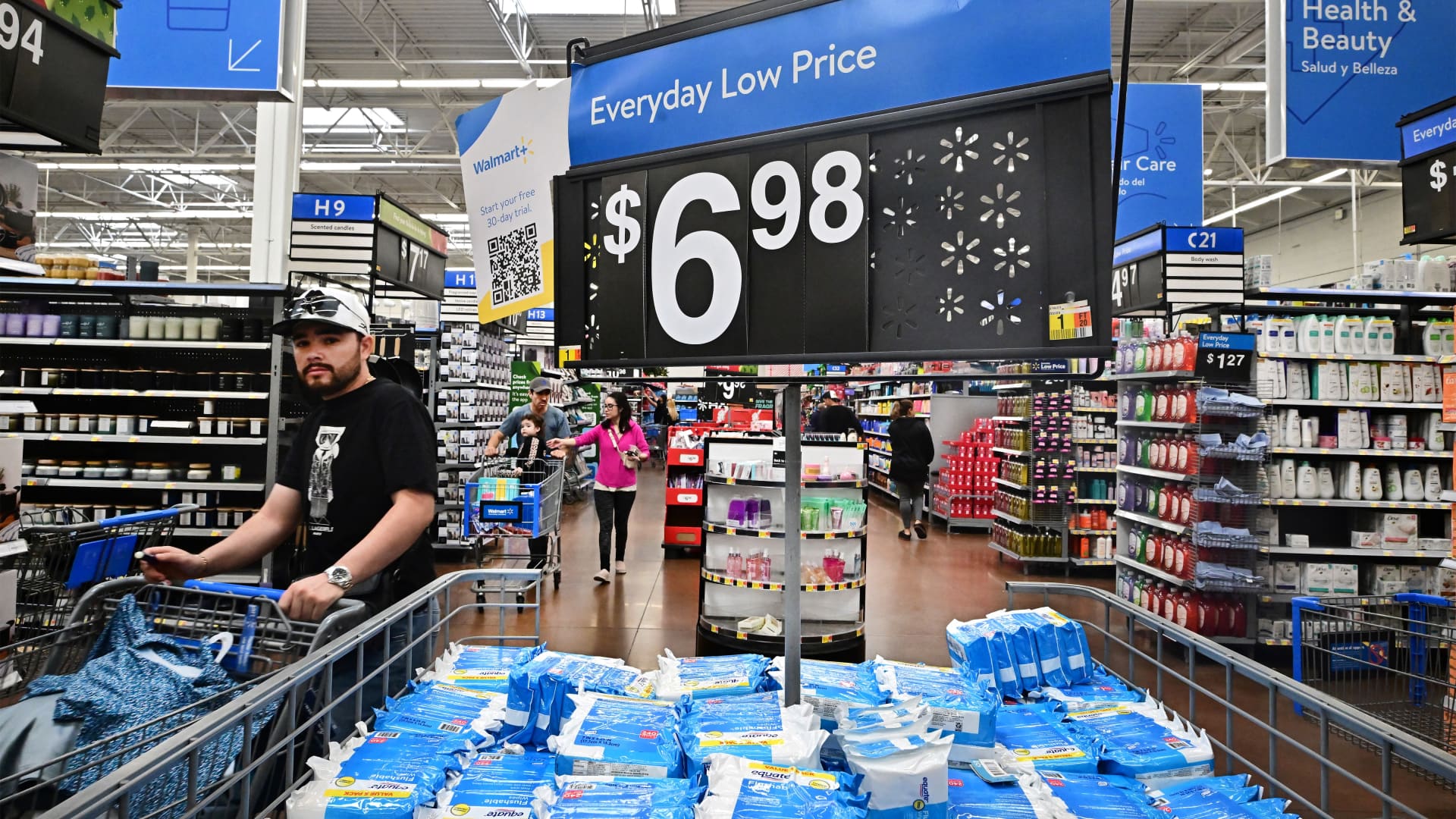Consumers shop for groceries at a retail chain store in Rosemead, California, on December 12, 2023.
Frederic J. Brown | AFP | Getty Images
A slowdown — but no recession.
That’s the broad consensus for the economy among experts as we head into 2024. After a post-pandemic period that saw growth surpass most forecasts — but also spurred breakneck inflation — Americans should now expect a period of reduced business activity.
Yet while some economists believe the risk of a recession will remain, others think a “soft landing” is more likely. That oft-talked-about scenario is understood as a combination of milder inflation alongside slow-and-steady employment growth.
“There’s more hope for it [a soft landing] going into 2024 than there had been heading into 2023,” said Greg McBride, chief financial analyst for Bankrate.
The forecast among many economists for a recession in 2023 did not come to pass. Indeed, from a purely data-driven perspective, history may consider this year to be a good one, as low unemployment and rapidly declining inflation prevailed.
Today, the unemployment rate stands at 3.7% — little changed from the 3.5% seen one year ago. The annual rate of inflation, meanwhile, has fallen to 3.1%, less than half of the 7.1% rate seen in November 2022.
As a result, consumer confidence has grown. In the most recent survey by the Conference Board, a nonprofit business research organization, good economic vibes among consumers rocketed to the highest reading since July.
Warning signs on the horizon
With additional context, each of these measures point to a slowdown on the horizon. The unemployment rate is up from the 3.4% low reached in April. And despite coming off the near double-digit highs in June 2022, inflation has not been able to break below 3%. In fact, it has bounced around in that 3% range for six consecutive months.
As for consumer confidence, it is still well below the post-pandemic high recorded in the spring of 2021.
Gus Faucher, senior vice president and chief economist at PNC Financial Services Group, said the unemployment rate is likely to increase to around 4% as consumers pull back on spending, causing job growth to slow.
But while the risk of recession remains “elevated,” it likely won’t occur unless there is a negative shock to the global economy, like wider conflict in the Middle East, where Israel is at war with Hamas fighters in Gaza, Faucher said.
“It [a recession] is less likely now than it was three or six months ago, just because of the ongoing strength we’ve seen,” Faucher added.
The economy has already slowed thanks to high interest rates, something consumers will continue to encounter in 2024, Bankrate’s McBride said. The Federal Reserve has kept rates elevated in its ongoing effort to wrestle inflation, and it isn’t likely to reduce them anytime soon.
Right now, credit card interest rates continue to average more than 20%. And even though mortgage rates are just starting to decline, the average 30-year interest rate still hovers around 6.5% to 7% — and even higher in certain faster-growing regions of the country. That range is about the same for car loans, too.
“Interest rates took the elevator going up, but are going to take the stairs coming down,” McBride said. While some Federal Reserve officials have begun to signal they would be open to cutting rates next year, McBride said they would come down “at a very modest rate.”
“We’re going to be in a high-interest-rate environment for some time,” he said.
Still, many consumers have weathered this environment, and will continue to do so next year, experts say.
In commentary released this week, Bank of America economists said “net wealth” has grown for many Americans, thanks to higher home prices and a banner year for the stock market. This will continue to fuel a healthy rate of purchasing, they said.
“Understanding the consumer continues to be more about ‘watch what I do and not what I say,'” the economists wrote, suggesting that shoppers are still comfortable with spending money even as they express concerns about the economy.
The economists added that recent retail sales reports indicate holiday spending this year “was more favorable than many expected,” while total hours worked have continued to expand.
Of course, this sunnier scenario of staying afloat financially without much difficulty does not apply to all Americans. The Bank of America economists note that when it comes to how savings and housing affordability have been distributed since the pandemic, many households are far from well-off.
And Bankrate’s McBride estimates that some 60% of Americans now live paycheck to paycheck.
Yet overall, “it appears the U.S. consumer is cooling, not retrenching,” the Bank of America economists said.

